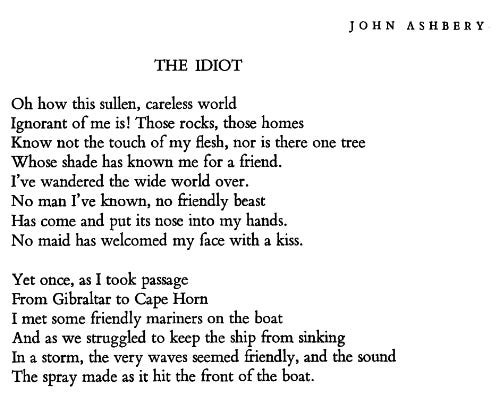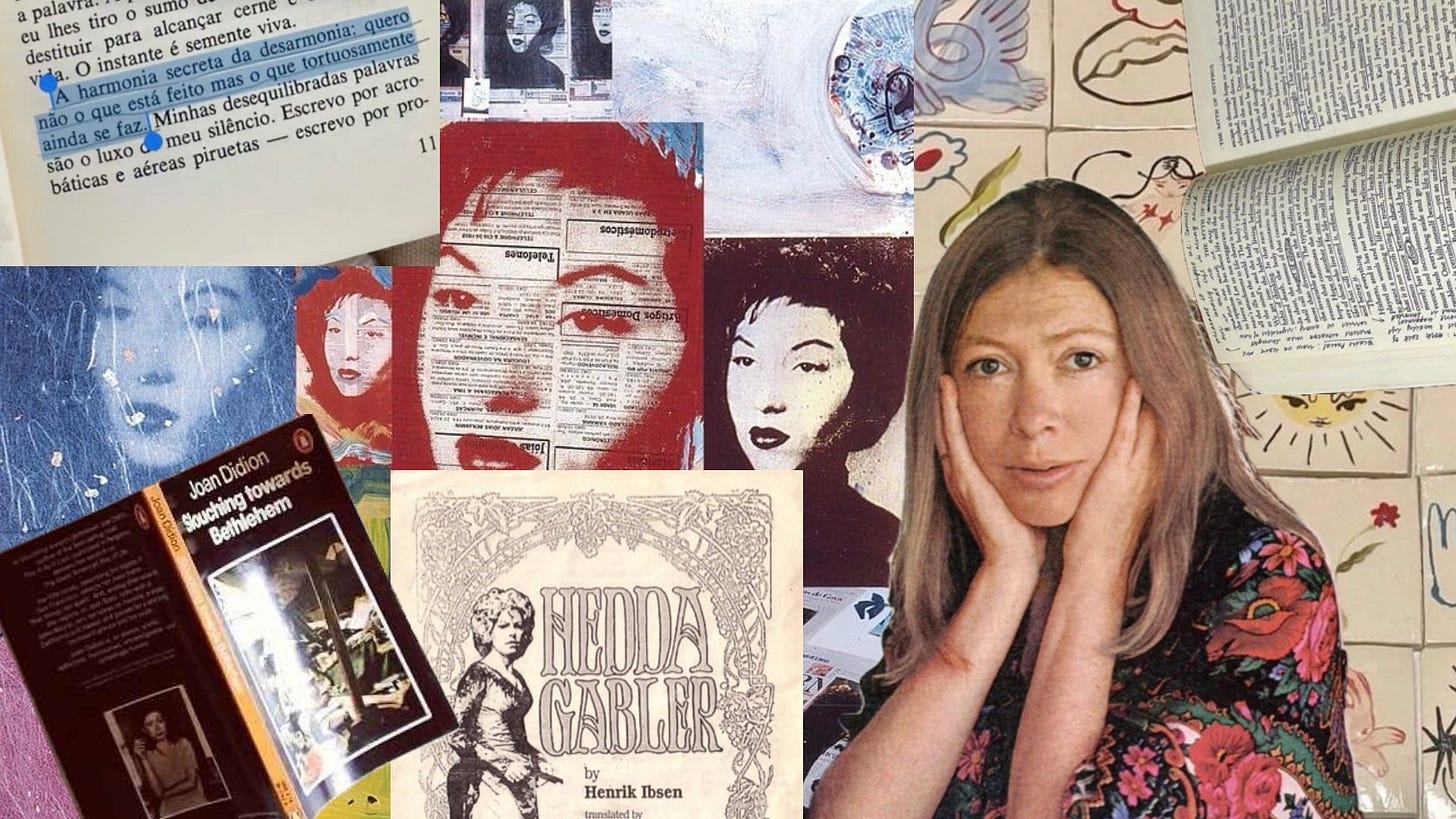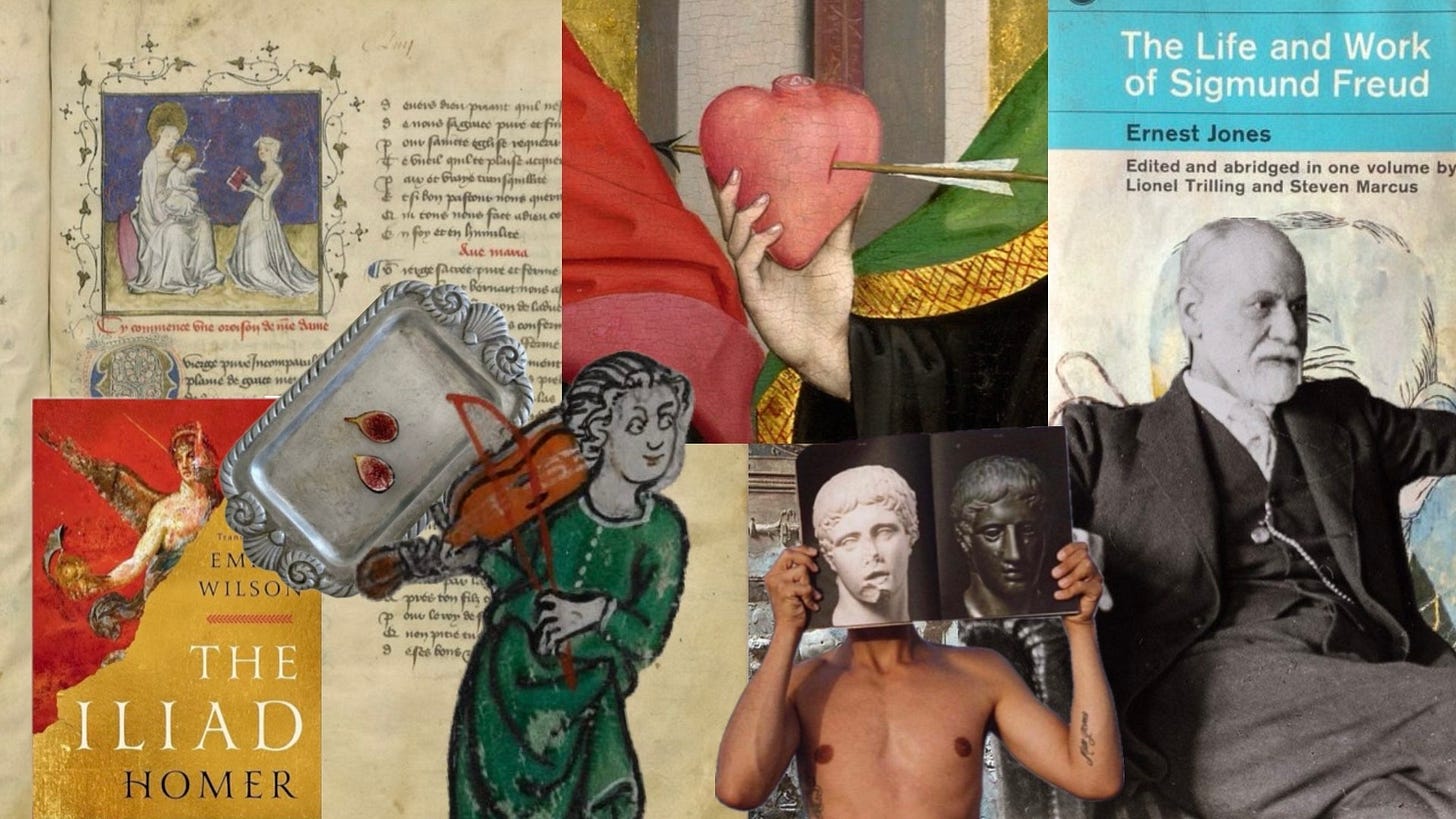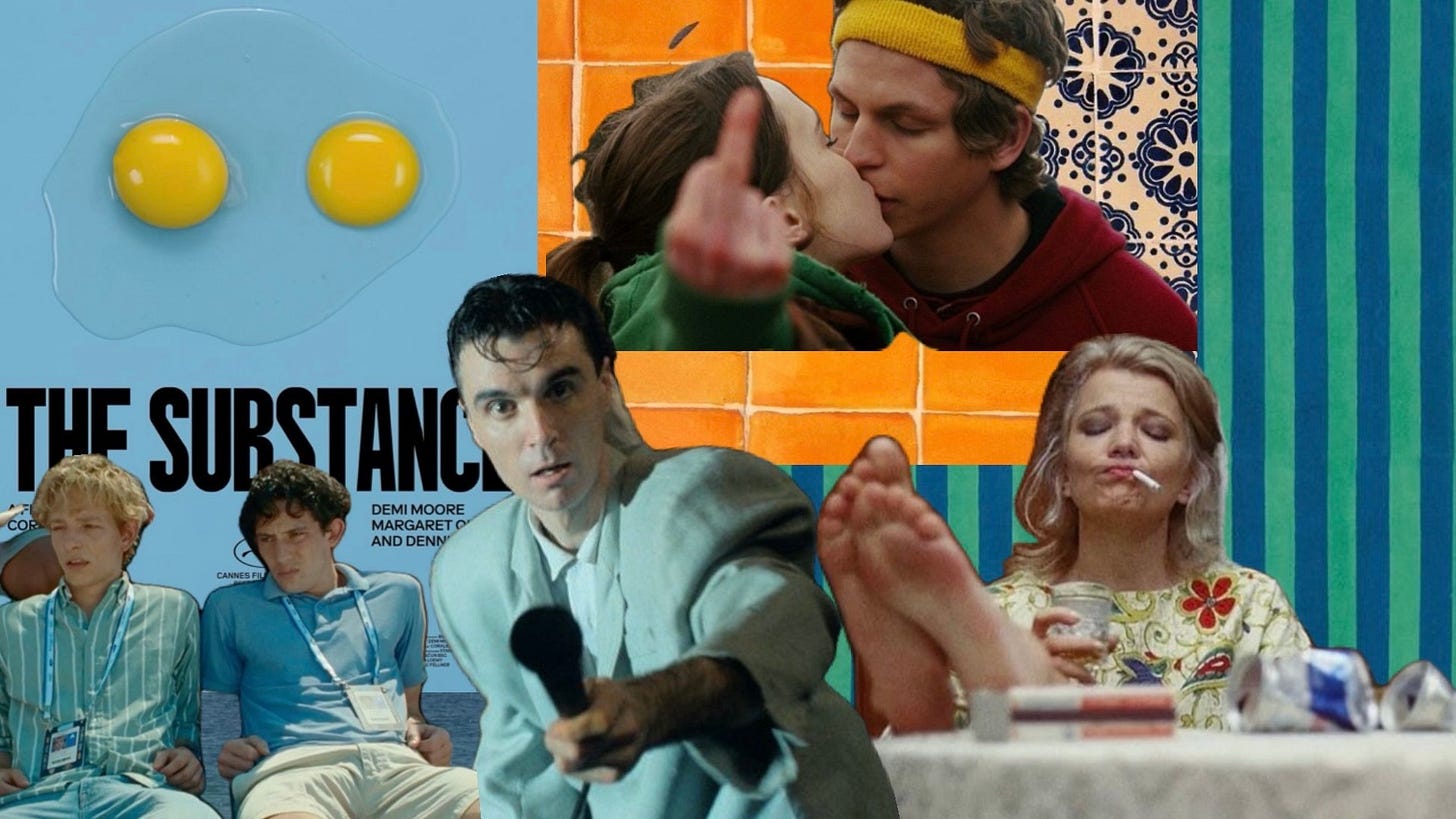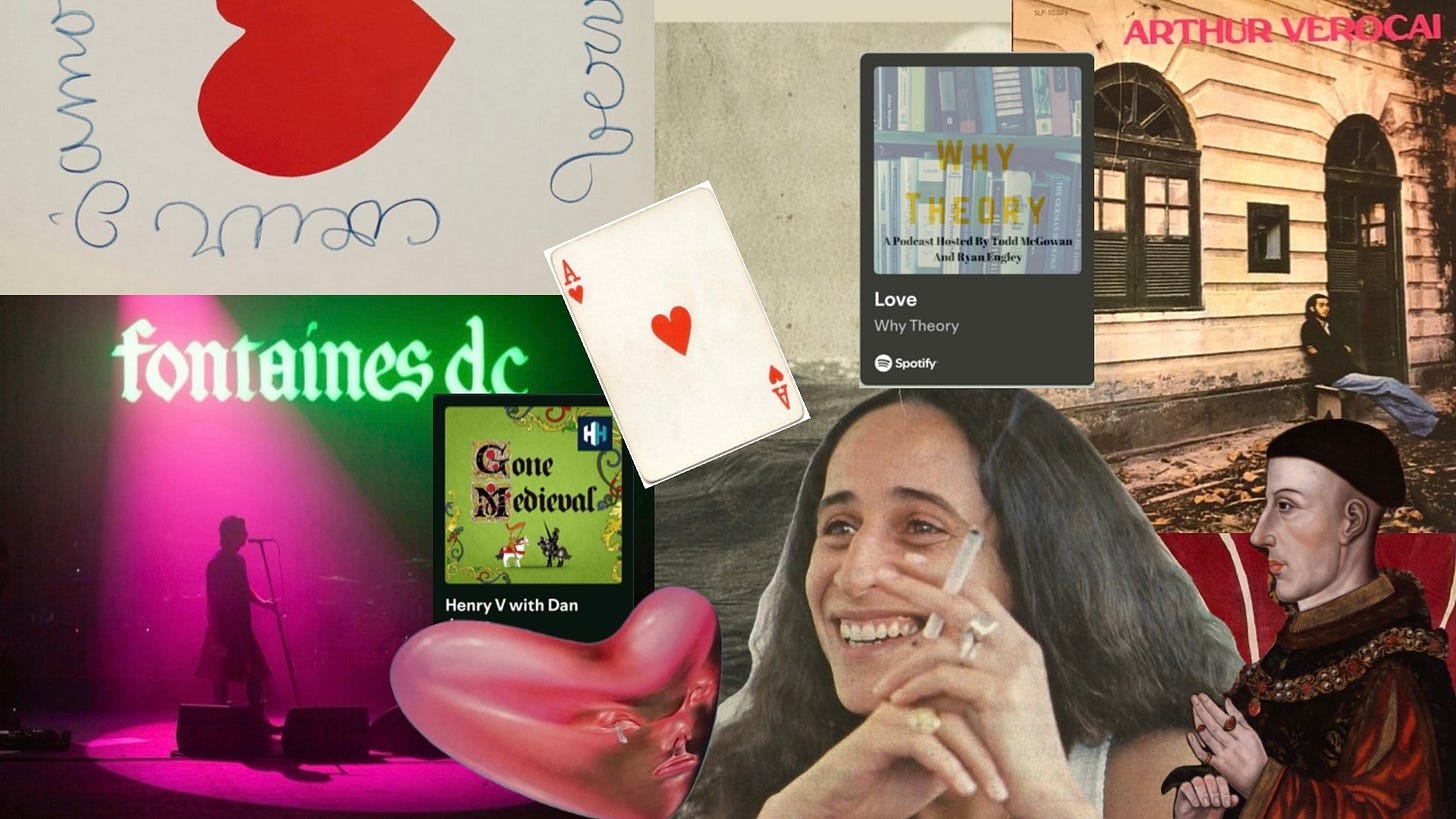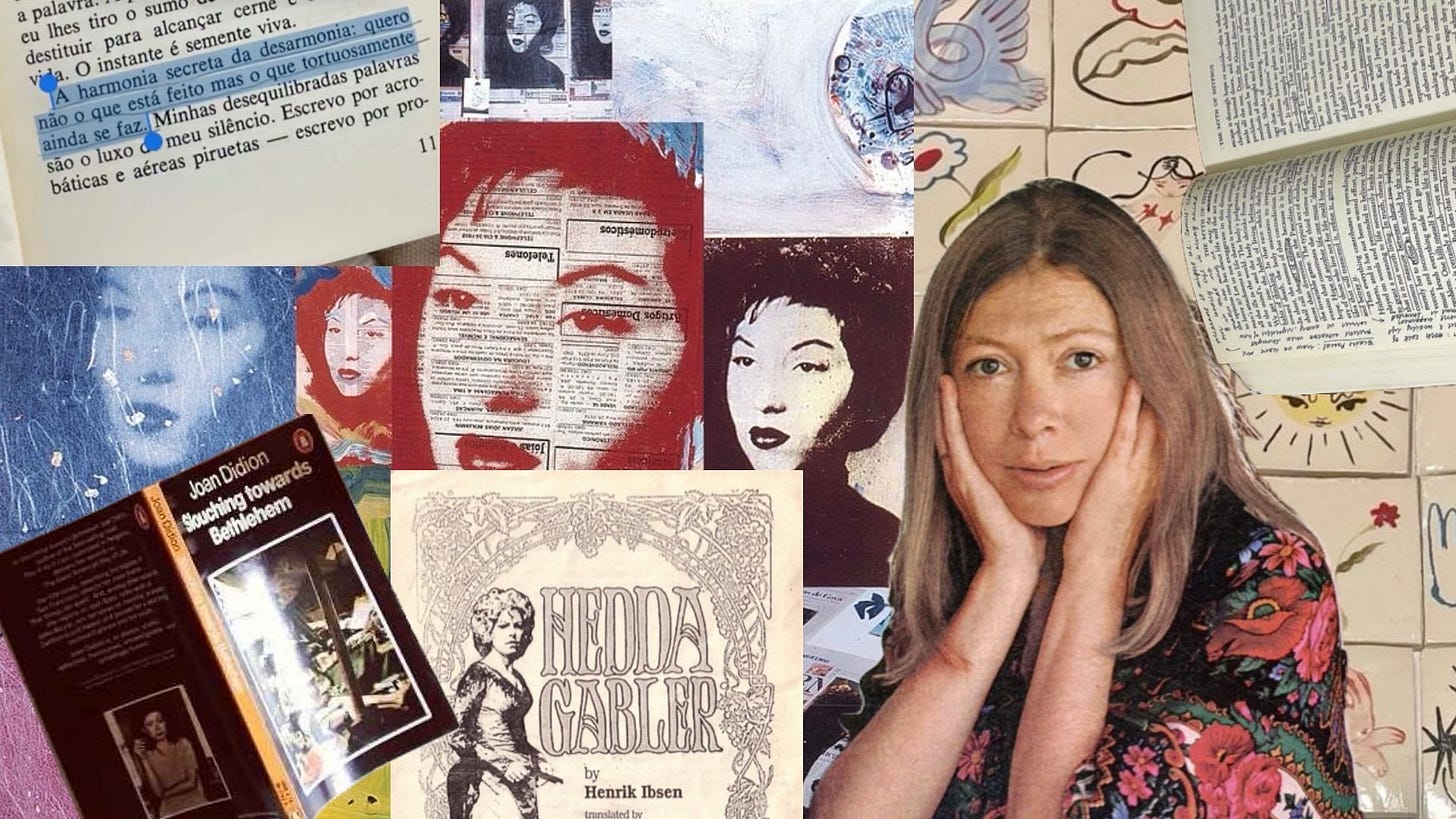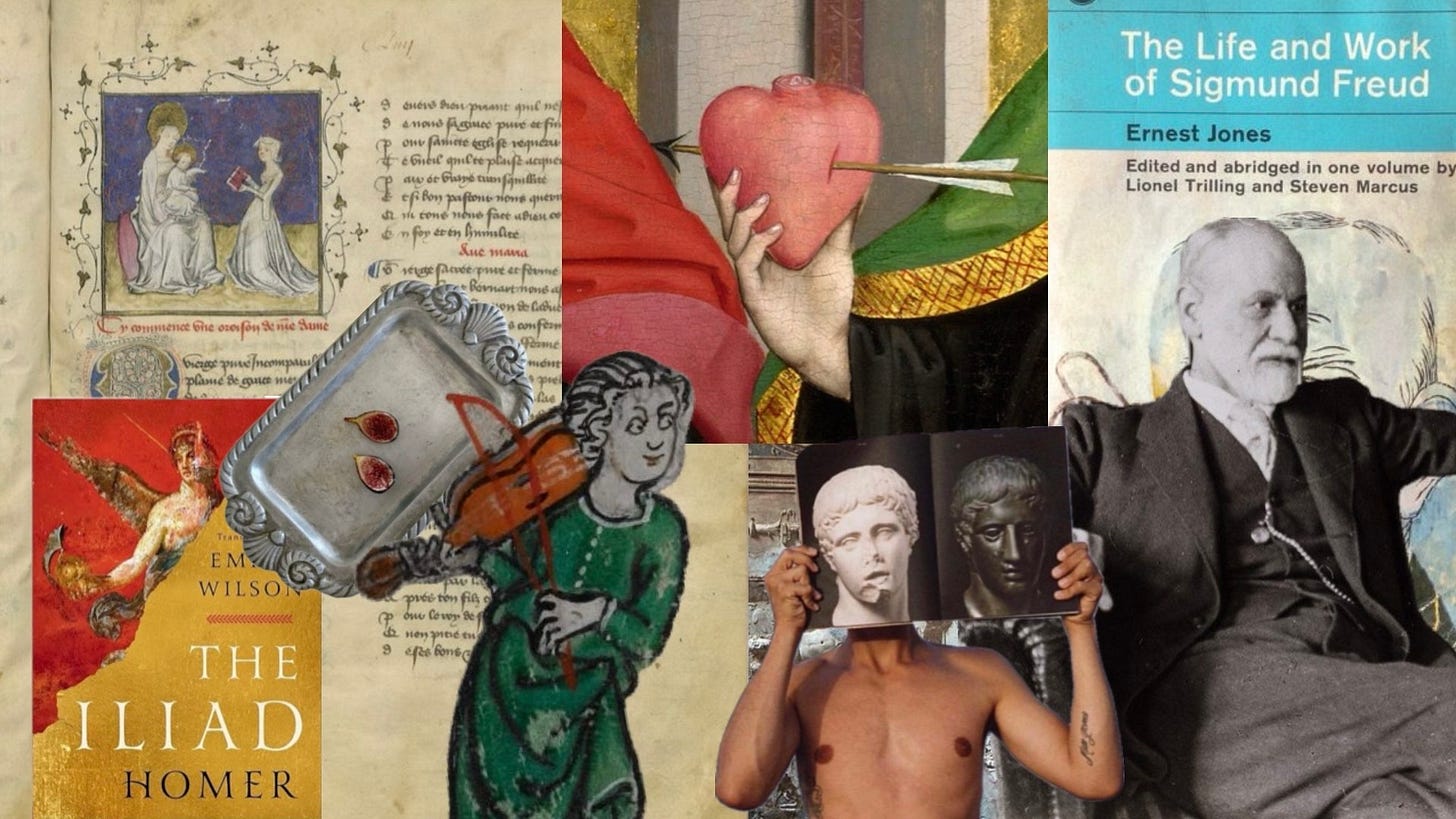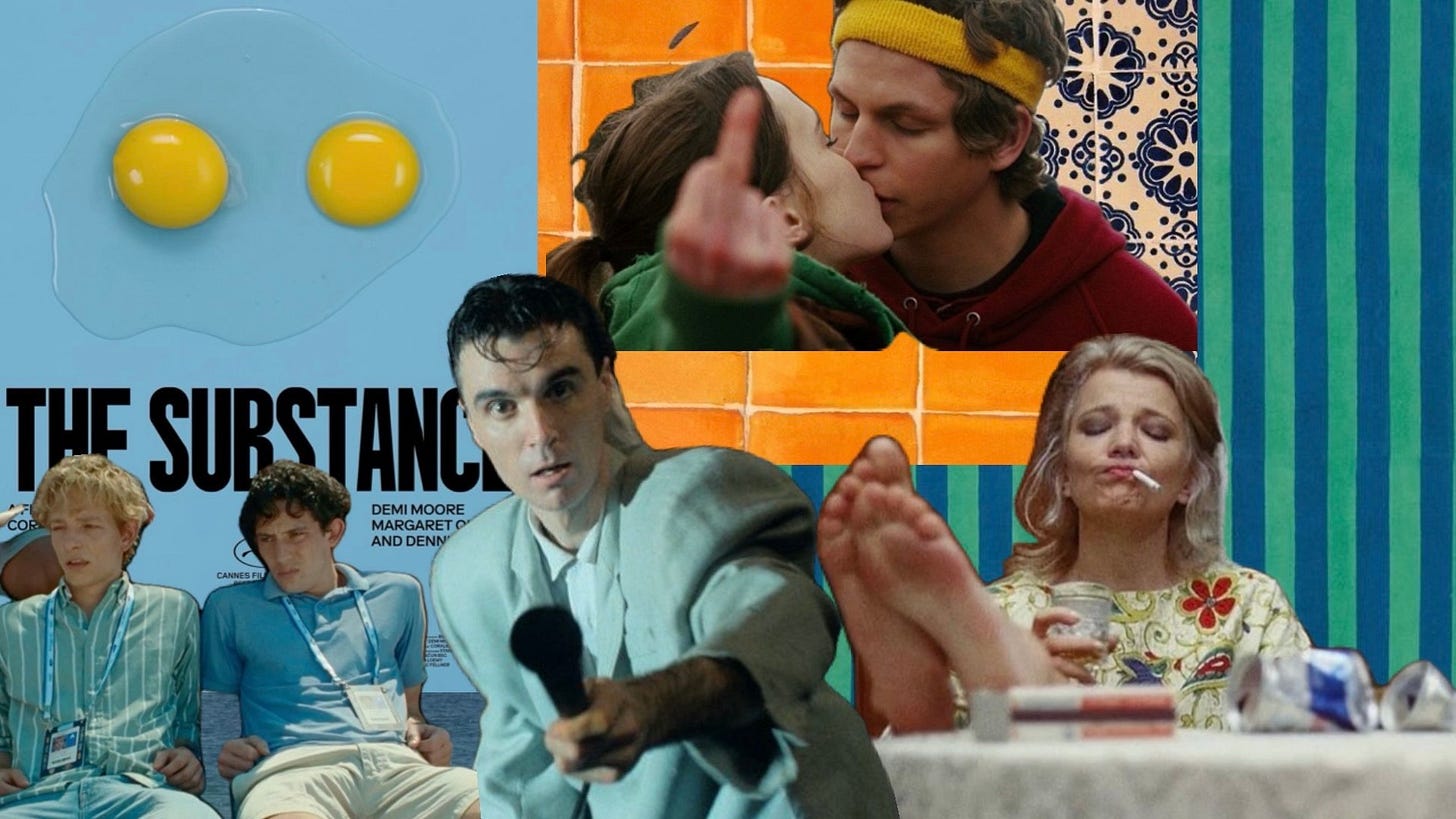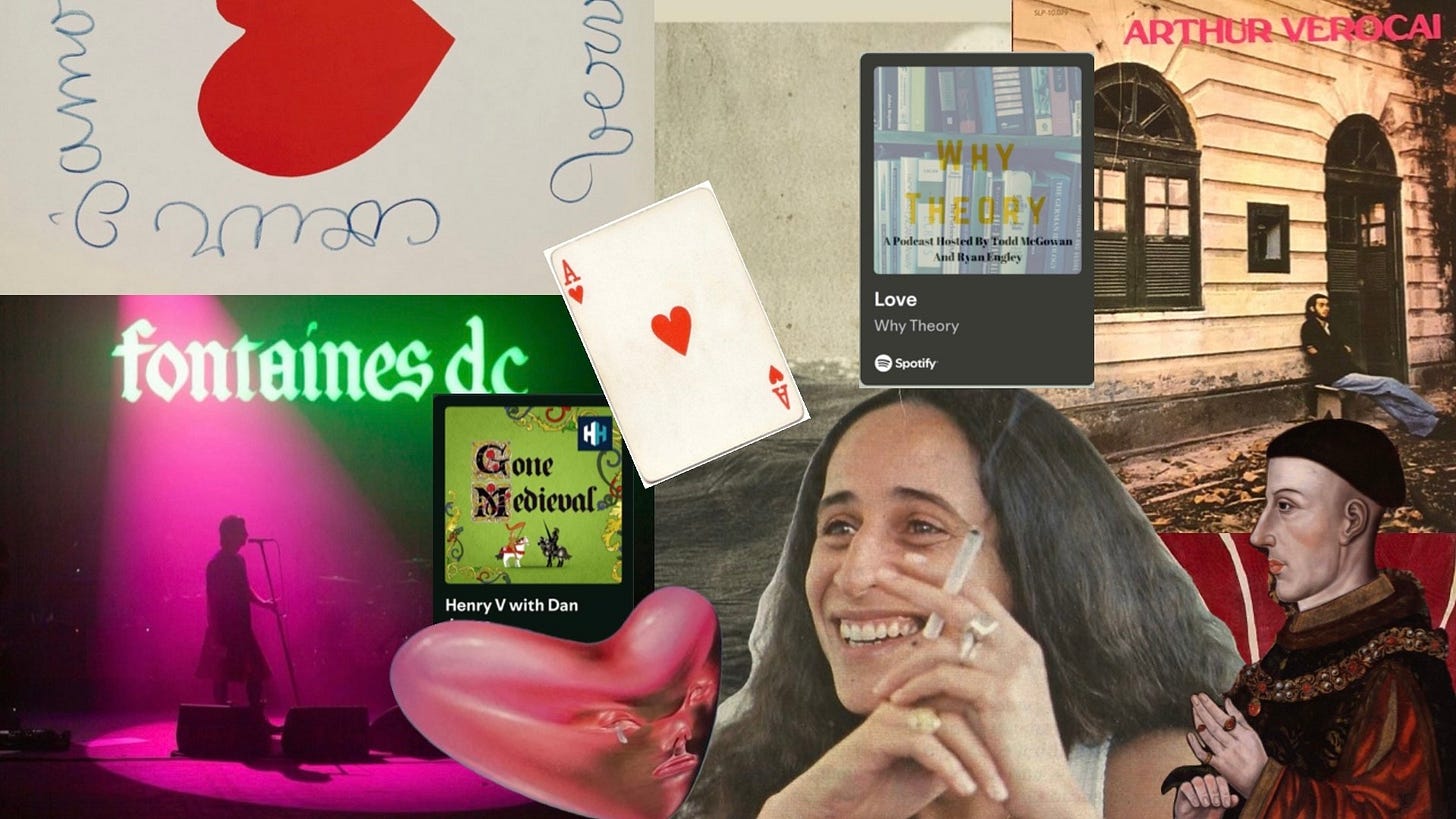Methought - September 2024
Monthly wrap-up: Didion as a mentor, Ibsen's tragedy, Clarice's approach to time, Freud's negative affirmations, Cassavetes (again), The Substance's empty criticisms, and a new favourite band
scroll down to read the English version
Caros Leitores,
Setembro foi um mês longo e lento. Escrevi mais do que li, porém foi apenas o início de várias ideias que até então seguem incompletas. Fui algumas vezes ao cinema (estava com saudade disso), revi filmes queridos e escutei podcasts muito bons. Estou animada para outubro pois, como uma pessoa que adora clichês, fico animada para ler e assistir coisas temáticas de Halloween.
O poema do mês é este de John Ashbery que eu acho lindo (tive uma fase obcecada por ele no começo do ano e depois ele acabou caindo no meu esquecimento — consequências de absorver informações demais).
LIVROS &TC
Hedda Gabler - Henrik Ibsen (1890)
“A feeling of release, in knowing that there really can be such a thing in the world as free and fearless action. Something irradiated with spontaneous beauty”
Esta é a segunda vez que leio uma peça de Ibsen, e sigo impressionada com a capacidade que ele tem de criar personagens com uma enorme profundidade psicológica. Hedda é uma personagem extremamente obscura e complexa, e a partir de descrições e construções de cenas pontuais, Ibsen é capaz de dizer muito com pouco — existem ambiguidades por toda parte ao mesmo tempo que a atmosfera da peça é de uma realidade dura e frieza objetiva.
A questão da performance social feminina é abordada pelo dramaturgo de uma forma que me lembrou muito Anna Karenina. A moralidade de Hedda (ou a falta dela) está profundamente ligada ao seu intenso medo de escândalos, e acho fascinante que seu único impedimento para trair o marido seja a aversão à vulgaridade, já que ter um caso “não é algo que se faça”. Hedda tem algo de “homem do subsolo” pois ao mesmo tempo que possui um complexo de superioridade, ela nutre um ódio por si mesma, por sua falta de coragem.
É uma peça claustrofóbica: a pressão aumenta, o cerco vai se fechando a cada minuto e no fim temos a trágica porém grata sensação de que não poderia ter sido diferente. A história tem algo dos filmes de Cassavetes, e Gena Rowlands seria uma ótima Hedda Gabler.
Slouching Towards Bethlehem - Joan Didion (1968)
Não deve ser surpresa para ninguém que eu — uma mulher de franja que escreve na internet — adoro Joan Didion; é parte do meu personagem e eu sou uma pessoa coerente exatamente como as outras garotas. Brincadeiras à parte, sempre me impressiona como a voz de Didion é única: melancolicamente realista, cientificamente interessada em comportamentos humanos, às vezes brutalmente honesta mas sempre demonstrando simpatia pela situação que ela observa.
Ela tem uma capacidade de observação invejável, e sempre que leio algo escrito por ela me esforço em dobro para prestar atenção e aprender, pois acredito que as melhores aulas de escrita consistem em apreciar a fundo aquilo que você, como escritor, mais admira. Temos estilos muito diferentes, mas é justamente por isso que tenho ela como guia e sempre que estou escrevendo imagino ela lendo e apago o que ela desaprovaria. Pode soar estranho, mas dependendo do assunto eu me deixo levar pela paixão e os primeiros rascunhos normalmente possuem um excesso de lirismo que na releitura me incomoda. É aí que entra Didion como minha crítica imaginária pois ela jamais aprovaria algo assim; ela me desafia a ser sincera sem ser piegas.
Como sempre, ela escreve muito sobre a California e isso normalmente não me interessa muito. Prefiro suas reflexões mais pessoais e/ou abstratas, e meus ensaios favoritos foram: Where the kissing never stops; Slouching towards Bethlehem; On self-respect; On morality; The seacoast of despair; Goodbye to all that.
Agua Viva - Clarice Lispector (1973)
É difícil falar de Agua Viva pois ele não é um livro comum. Li em conjunto em um dos meus clubes do livro e foi interessante comparar as experiências. Apesar de curto este é um livro extremamente denso, pois Clarice não facilita: sempre que estamos chegando perto de entender alguma coisa ela muda e nos conduz para outro lugar; a tentativa quase desesperada de capturar o instante, o momento exato do presente, do pensamento para a página sem interferências — mas é impossível, pois é como se o Agora fosse sempre intangível, inalcancável, e só pudesse ser capturado pela escrita uma vez que se torna Passado.
Diante desse “tema”, eu não pude deixar de pensar em Four Quartets, o qual aborda toda essa questão temporal por esse viés, mas com uma linguagem totalmente diferente. É um livro muito bonito, e várias vezes me peguei pensando “eu entendo!”, porém, jamais me peçam para explicar.
ARTIGOS & ENSAIOS
Negation - Sigmund Freud (1923)
Psicanálise é algo que muito me interessa, principalmente no âmbito das análises literárias (quanto à isso, me inspiro bastante em Hélène Cixous e Camille Paglia) e apesar das controvérsias, tudo que eu li de Freud até hoje eu não só gostei como achei bastante útil. Nesse ensaio bem curtinho ele explica que, na análise, o psicanalista por vezes pode “ignorar” a negativa num contexto de associação que o próprio paciente fez, e tomar como afirmativa a afirmação diante da mera existência de tal associação, por exemplo: se o paciente antecipa o analista dizendo “você quer saber quem a pessoa do meu sonho poderia ser. Não é minha mãe” — o fato de existir essa associação materna já comprova que o paciente lembrou da mãe no sonho e fez essa significação — ou seja, era a mãe no sonho.
Esta abordagem é perigosa pois pode colocar o Psicanalista numa posição de infalibilidade pois, se o paciente concordar com ele, então a interpretação está correta; mas se o paciente contradizer, é apenas um sinal de sua resistência, o que novamente mostra que o piscanalista estava certo. Ainda assim, é uma abordagem que para mim faz sentido, pois Freud apenas diz que a negação de um pensamento ou associação é a versão intelectualizada (racional) da repressão exercida pelo inconsciente:
Negation is a way of taking cognizance of what is repressed; indeed it is already a lifting of the repression, though not, of course, an acceptance of what is repressed. […] The outcome of this is a kind of intellectual acceptance of the repressed, while at the same time what is essential to the repression persists.
Tendo lido (e adorado) o ensaio The Uncanny (Das Unheimliche) eu senti que entendi melhor e pude ser mais convencida pelo argumento apresentado aqui.
On Complicated… - Emily Wilson’s Substack
Emily Wilson, a tradutora que publicou as traduções mais recentes de A Ilíada e A Odisséia para o inglês, começou um substack e eu obviamente me inscrevi pois sou uma grande fã do trabalho dela. Eu estava lendo A Ilíada traduzida por ela e gostei muito do trabalho, principalmente porque ela explica tudo: toda a história da linguagem do poema, o contexto histórico de quando Homero (ou quem quer que seja) compôs esses versos, o lugar que esse poema ocupava na cultura, e talvez o mais interessante, as escolhas de tradução que ela fez (afinal para traduzir uma obra dessas grandes escolhas precisam ser feitas e com muito cuidado). Nesse texto, ela fala sobre tais escolhas, sobre o processo de tradução e sobre algumas críticas que recebeu. Eu realmente amo ela.
Why did Bloody Knights write love songs about spring blossoms? - Jennifer Saltzstein for Psyche Magazine (2024)
Esse artigo examina a tradição das baladas de trovadores medievais franceses, e como a música medieval fornece pistas para que possamos compreender a cultura social da época, principalmente com relação à guerra, à propriedade privada e à papéis de gênero. Achei interessante pensar o Cavaleiro, o ideal de masculinidade militar, como um poeta inspirado por jardins para escrever sobre amor; é bem pitoresco e percebe-se como isso inspirou o romantismo posteriormente: “for knight songwriters, feelings of love and the desire to sing are often prompted directly by viewing the landscape.”
FILMES & SÉRIES
Stop Making Sense - Johnathan Demme (1984)
Poucas vezes eu me diverti tanto numa sessão de cinema. Inclusive acho que para esse filme deveria ser permitido levantar e cantar, como se fosse um show de verdade. David Byrne é um gênio, mas o efeito eufórico transmitido pelo filme se deve ao conjunto da banda junto com David — todo mundo ali estava com uma energia absurda e claramente se divertindo, tanto que às vezes eles começavam a rir em meio a performance! Amei o conceito de começar apenas com David na voz e violão e gradualmente a quantiadade de instrumentos e pessoas aumenta até o palco ficar maravilhosamente preenchido, e tudo funciona entre eles, foi lindo de ver.
Juno - Jason Reitman (2007)
Um dos meus filmes favoritos que gosto de rever depois de uma semana ruim; Juno tem o meu tipo de humor e esse é um dos raos filmes que me dão vontade de ser amiga de todo mundo ali. A trilha sonora é uma das melhores que existem no cinema, sem discussão.
Uma Mulher sob Influência - John Cassavetes (1974)
Exatamente um mês depois de ver esse filme brilhante pela primeira vez na televisão de casa eu tive o privilégio de reassisti-lo no cinema com várias pessoas queridas, e foi interessante debater sobre depois e ver a reação da platéia, por exemplo: as pessoas deram risadas em momentos que para mim não tinham graça nenhuma, por serem preocupantes ou mesmo melancólicos.
Não vou me repetir pois já fiz meus comentários na edição passada da newsletter, mas fica aqui meu enorme apreço por esse filme e por todos os envolvidos nele.
Challengers - Luca Guagagnino (2024)
Talvez por eu estar no meio de Infinite Jest, que aborda o tênis de forma muito profunda e complexa, eu me senti compelida a rever esse filme sensacional, e juro a vocês que várias frases de DFW me vieram à mente enquanto eu estava assistindo. Agora eu sinto que finalmente entendi o que Tashi quis dizer com “Tennis is a relationship”.
A Substância - Coralie Fargeat (2024)
Por incrível que pareça, o fato desse filme ser totalmente absurdo não tem nada a ver com o gênero de terror/ficção-científica, mas sim com um world building que não faz o menor sentido (e mesmo que essa absurdez seja intencional, a excecução dela foi preguiçosa e não se justifica pela ideia) — Como assim uma menina de 20 e poucos anos quebrou uma parede no banheiro e construiu perfeitamente uma câmara com uma porta secreta em três dias? E existem espaços vazios entre apartamentos? A substância é dada de graça, e se sim por quê? Alguém sem treinamento médico é capaz de usar a substância? Porque eu não conseguiria fazer tudo aquilo corretamente. E como assim o auge da fama é ter um programa fitness na televisão? Quem ainda assiste televisão?
No geral, acho que a obra falha em tudo que se propõe. O arco narrativo é construído como uma fábula (ou “cautionary tale”) e quem é punido é a vítima “transgressora” do sistema por buscar uma “fonte da juventude”, ao invés de, no mínimo, expor o sistema em si que força a protagonista a buscar essa fonte (todos os homens do filme são grotescamente caricatos mas terminam livres de consequências). Não me convence que isso foi proposital para ser “realista” sobre a relação entre mulheres-beleza-capitalismo. Na verdade, nada nesse filme me convence, mas esse aspecto talvez seja o mais grave pois é onde está a enorme falha (moral?) na crítica que o filme tenta fazer (se é que tenta, já não sei mais).
Eu até tinha boas expectativas para A Substância, mas ele já me perdeu com aquela patética sequência inicial da estrela na calçada da fama: daí em diante o filme se torna cada mais repetitivo e cansativo, reprisando cenas e falas que vimos dez minutos antes com uma condescendência extremamente irritante, reiterando incessantemente o “argumento” extremamente raso sobre padrões de beleza, caso não tenha ficado claro nas primeiras cinco vezes. O que menos me incomodou foram as cenas gore — de fato, é o único elemento interessante desse filme que não precisava de maneira alguma ser tão longo quanto foi.
Rings of Power - series (2022 - )
Eu já sabia que essa série ia me decepcionar e eu continuo assistindo só porque eu sou muito apegada ao universo de Tolkien, mas como sempre acontece, fica claro que os responsáveis por adaptar essa história não tem carinho pelo material original e não entendem que não adianta gastar milhões com efeitos visuais construindo uma terra-média se a narrativa não é boa. Por exemplo, desde o começo a personagem de Galadriel foi completamente deturpada, e o pseudo romance que ela teve com Sauron — de todas as pessoas possíveis — é uma vergonha. Tem coisas boas na série, mas no geral, não serve nem para quem é fã nem para quem não é.
MÚSICA & PODCASTS
As Canções que Você Fez para Mim - Maria Bethânia (1992)
Esse é, sem exagero, um dos maiores discos da música brasileira e ponto final. As versões de Bethânia são muito melhores que as de Roberto Carlos (que minha bisavó me perdoe) e escutei sem parar esse mês, me sentindo numa novela de Manoel Carlos.
Arthur Verocai (álbum) (1971)
Meio ridículo que eu tenha descoberto esse disco brasileiro fantástico por causa de Tyler the Creator, mas acontece. Talvez seja por isso que minha irmã de 19 anos conheça Verocai e meu pai de 72 (que inclusive é músico) nunca tenha ouvido falar. As músicas não pertecem a um único gênero, mas é um som bem típico do final da década de 60 e começo da de 70 (e claramente tem influência de Deodato, que também gosto muito).
Li uma entrevista do Verocai, e achei muito engraçado o que ele disse sobre o redescobrimento desse disco que na época foi totalmente descartado:
— Pensei: “Não sou cantor não sou nada, o que vou fazer aqui? Vou vender milhões de cópias? Não, então vou botar música ali dentro e foda-se!” Fiz o que eu sentia e foi uma foi uma desgraça. Na época, ninguém curtiu, o disco não teve nem show de lançamento — recorda-se. — O chato é que eu fiquei com uma fama de maluco beleza, de irresponsável de ter feito um disco daquele jeito. O pessoal era muito careta. Eu era eclético, esse disco tem bossa, tem funk, tem até um country jazzificado, o “Caboclo”.
Romance - Fontaines D.C. (2024)
Provavelmente a melhor descoberta musical do ano — no momento estou totalmente obcecada por Fontaines D.C. e esse álbum passa uma sensação que me lembra o Arctic Monkeys de uma década atrás. É divertido, é grungy e ao mesmo tempo que tem influências óbvias eles não chegam a ser cópia de ninguém. Imagino que a esta altura deve ser muito difícil inovar como uma banda de rock indie (quantas músicas sobre cigarro e falta de sentido é possível escrever?) mas eles até que conseguem. Queria muito ir pra um show. Fiquem com esse cover de Say Yes to Heaven:
Love - Why Theory Podcast
“Conservativism is never so successful than when it limits the horizon of possibility for the left; and how does it limit the horizons and possibilities for the left? It makes you start thinking in its terms, and if you start thinking in its terms (as in villainizing people) then you’ve agreed with their basic premise — that there are others who are villains and universal Love and inclusivity are fundamentally impossible.”
Incrível esse episódio do Why Theory (um podcast sobre filosofia e psicanálise que to viciada) que fala sobre o Amor em suas mais variadas formas, desde as teorias sobre amor romântico presentes em O Banquete de Platão, ao amor Ágape de São Francisco de Assis, à filosofia Hegeliana (“Love is finding oneself in otherness”) e os ideais Marxistas de inclusão e comunidade. Para a minha surpresa eles conseguiram encaixar um debate muito interessante sobre o moralismo dos partidos políticos da Esquerda versus o da Direita dentro do contexto da discussão sobre Amor, tocando em pontos como hipocrisia e honestidade, soberba moral, individualismo e união. Enfim, foi uma grande conversa e tem muita coisa dita ai que me fez pensar bastante.
Henry V with Dan Jones - Gone Medieval Podcast
Talvez vocês já tenham notado meu hiperfoco na Idade Média inglesa (especificamente de Richard II à Henry VII) e por isso eu não resisto a um podcast histórico sobre esse tema, ainda mais com Dan Jones (autor de vários best sellers sobre os Plantagenetas, Guerra das Rosas etc.) Neste episódio eles discutem o “verdadeiro” Henry V, comparando registros históricos com o personagem icônico de Shakespeare, meu querido Príncipe Hal. Recomendo muito mas admito que é preciso algum conhecimento prévio sobre o assunto para entender a discussão.
Dear Readers,
September was a long, slow month. I wrote more than I read, but it was only the beginning of several ideas that remained incomplete. I went to the cinema a few times (I missed it), re-watched some beloved films and listened to some great podcasts. I'm excited for October because, as someone who loves clichés, I like to read and watch Halloween-themed things.
The poem of the month is this one by John Ashbery, which I find beautiful (I had a phase of obsessing over him earlier in the year and then he ended up falling by the wayside — consequences of absorbing too much information).
BOOKS &TC
Hedda Gabler - Henrik Ibsen (1890)
“A feeling of release, in knowing that there really can be such a thing in the world as free and fearless action. Something irradiated with spontaneous beauty”
This is the second time I've read an Ibsen play, and I remain impressed by his ability to create characters with immense psychological depth. Hedda is an extremely dark and complex character, and through descriptions and specific scene constructions, Ibsen is able to say a lot with very little — there are ambiguities everywhere, while the atmosphere of the play is one of harsh reality and objective coldness.
The playwright tackles the question of female social performance in a way that reminded me very much of Anna Karenina. Hedda's morality (or lack thereof) is deeply connected to her intense fear of scandal, and I find it fascinating that her only impediment to cheating on her husband is her aversion to vulgarity since having an affair is ‘not something one does’. Hedda has something of an ‘underground man’ about her, because, at the same time as having a superiority complex, she harbours a self-hatred for her lack of courage.
It's a claustrophobic play: the pressure builds, the siege closes in every minute and by the end, we have the tragic but gratifying feeling that it couldn't have been any different. The story was reminiscent of Cassavetes' films, and Gena Rowlands would make a great Hedda Gabler.
Slouching Towards Bethlehem - Joan Didion (1968)
It should come as no surprise to anyone that I - a woman with French fringes who writes on the internet - adore Joan Didion; it's part of my persona and I'm a coherent person just like the other girls. Jokes aside, I'm always struck by how unique Didion's voice is: melancholically realistic, scientifically interested in human behaviour, sometimes brutally honest but always showing sympathy for the situation she's observing.
She has an enviable capacity for observation, and every time I read something written by her I try twice as hard to pay attention and learn, because I believe that the best writing lessons consist of thoroughly appreciating what you, as a writer, admire most. We have very different styles, but that's precisely why I have her as a guide and whenever I'm writing I imagine her reading and delete what she would disapprove of. It may sound strange, but depending on the subject I get carried away by passion and the first drafts usually have an excess of lyricism that bothers me when I re-read them. That's where Didion comes in as my imaginary critic because she would never approve of something like that; she challenges me to be honest without being corny.
As always, she writes a lot about California and that doesn't usually interest me. I prefer her more personal and/or abstract reflections, and my favourite essays were: Where the kissing never stops; Slouching towards Bethlehem; On self-respect; On morality; The seacoast of despair; Goodbye to all that.
Agua Viva - Clarice Lispector (1973)
It's difficult to talk about Agua Viva because it's not an ordinary book. I read it in one of my book clubs and it was interesting to compare experiences. Although short, this is an extremely dense book, because Clarice doesn't make it easy: whenever we're getting close to understanding something, she switches and takes us somewhere else; the almost desperate attempt to capture the instant, the exact moment of the present, from thought to page without interference — but it's impossible, because it's as if the Now is always intangible, unreachable, and can only be captured by writing once it becomes Past.
Faced with this ‘theme’, I couldn't help but think of Four Quartets, which tackles the whole temporal issue from this angle, yet in a totally different language. It's a beautiful book, and several times I found myself thinking ‘I get it!’, but don't ever ask me to explain it.
ARTICLES & ESSAYS
Negation - Sigmund Freud (1923)
Psychoanalysis is something I'm very interested in, especially in the field of literary analyses (in this respect, I'm very inspired by Hélène Cixous and Camille Paglia) and despite the controversies, everything I've read by Freud so far I've not only enjoyed but found very useful. In this very short essay, he explains that, in analysis, the psychoanalyst can sometimes ‘ignore’ the negation in the context of an association that the patient himself has made, and take the claim as affirmative in the face of the mere existence of such an association, for example: if the patient anticipates the psychoanalyst saying ‘you want to know who the person in my dream could be. It's not my mother’ — the fact that this maternal association exists already proves that the patient remembered the mother in the dream and signified it — in other words, it was the mother in the dream.
This approach is tricky because it can put the psychoanalyst in a position of infallibility. After all, if the patient agrees with him, then the interpretation is correct; but if the patient contradicts, it's just a sign of his resistance, which again shows that the psychoanalyst was right. Even so, it's an approach that makes sense to me, because Freud only states that the denial of a thought or association is the intellectualised (rational) version of the repression exercised by the unconscious:
Negation is a way of taking cognizance of what is repressed; indeed it is already a lifting of the repression, though not, of course, an acceptance of what is repressed. […] The outcome of this is a kind of intellectual acceptance of the repressed, while at the same time what is essential to the repression persists.
Having read (and loved) the essay The Uncanny (Das Unheimliche) I felt I understood it better and could be more convinced by the argument presented here.
On Complicated… - Emily Wilson’s Substack
Emily Wilson, the translator who published the most recent translations of The Iliad and The Odyssey into English, started a substack and I obviously signed up because I'm a big fan of her work. I was reading her translation of The Iliad and I really enjoyed it, mainly because she explains everything: the whole history of the poem's language, the historical context of when Homer (or whoever) composed these verses, the place this poem occupied in the culture, and perhaps most interestingly, the translation choices she made (after all, to translate such a great work, choices have to be made, and with great care). In this piece, she talks about these choices, the translation process and some of the criticism she has received. God I love her.
Why did Bloody Knights write love songs about spring blossoms? - Jennifer Saltzstein for Psyche Magazine (2024)
This article examines the tradition of French medieval troubadour ballads, and how medieval music provides clues for us to understand the social culture of the time, especially in relation to war, private property and gender roles. I found it interesting to think of the knight, the ideal of military masculinity, as a poet inspired by gardens to write about love; it's quite picturesque and you can see how it inspired romanticism later on: ‘for knight songwriters, feelings of love and the desire to sing are often prompted directly by viewing the landscape.’
FILMS & SERIES
Stop Making Sense - Johnathan Demme (1984)
Few times have I had so much fun at a cinema screening. I even think that you should be allowed to stand up and sing for this film as if it were a real concert. David Byrne is a genius, but the euphoric effect conveyed by the film is due to the band as a whole together with David - everyone there was so energetic and clearly enjoying themselves, so much so that sometimes they started laughing in the middle of the performance! I loved the concept of starting with just David on vocals and guitar and gradually the number of instruments and people increases until the stage is wonderfully full, and everything works between them, it was beautiful to see.
Juno - Jason Reitman (2007)
One of my favourite films that I like to revisit after a bad week; Juno has my kind of humour and it's one of the rare films that makes me want to be friends with everyone in it. The soundtrack is one of the best in cinema, no argument there.
A Woman Under the Influence - John Cassavetes (1974)
Exactly one month after seeing this brilliant film for the first time on television at home, I had the privilege of re-watching it at the cinema with lots of dear people, and it was interesting to discuss it afterwards and see the audience's reaction, for example: people laughed at moments that for me weren't funny at all, being disturbing or even melancholy.
I won't repeat myself as I already made my comments in the last edition of the newsletter, but I would like to express my deep appreciation for this film and all of those involved in it.
Challengers - Luca Guagagnino (2024)
Perhaps because I was in the middle of Infinite Jest, which deals with tennis in an intense and complex way, I felt compelled to revisit this spectacular film, and I swear to you that several phrases from DFW came to mind while I was watching it. Now I feel I've finally understood what Tashi meant by ‘Tennis is a relationship’.
The Substance - Coralie Fargeat (2024)
Oddly enough, the fact that this film is totally absurd has nothing to do with the horror/science fiction genre, but rather with a world-building that doesn't make the slightest bit of sense (and even if this absurdity is intentional, the execution of it was lazy and not justified by the idea) — How did a 20-something girl break through a wall in the bathroom and perfectly build a chamber with a secret door in three days? And are there empty spaces between flats? Is the substance given away for free, and if so, why? Can someone without medical training use the substance? Because I couldn't do all that properly. And what do you mean the height of fame is having a fitness show on television? Who still watches television?
Overall, I think the film fails in everything it sets out to do. The narrative arc is constructed as a fable (or ‘cautionary tale’) and the one who is punished is the ‘transgressive’ victim of the system for seeking a ‘fountain of youth’, instead of at least exposing the system itself that forces the protagonist to seek this fountain (all the men in the film are grotesquely caricatured and end up free of consequences). I'm not convinced that this was done on purpose to be ‘realistic’ about the relationship between women-beauty-capitalism. In fact, nothing in this film convinces me, but this aspect is perhaps the most significant because it's where lies the huge (moral?) flaw in the critique that it tries to make (if it tries at all, I don't know anymore).
I had high hopes for The Substance, but it already lost me with that pathetic opening sequence of the star on the walk of fame: from then on, the film only became more and more repetitive and tiresome, replaying scenes and lines that we saw ten minutes earlier with an extremely irritating condescension, incessantly reiterating the extremely shallow ‘argument’ about beauty standards, in case it wasn't clear the first five times. What bothered me the least was the gore scenes — indeed, it's the only interesting element of a movie that in no way needed to be as long as it was. It literally could have been an e-mail.
Rings of Power - series (2022 - )
I already knew that this series was going to disappoint me and I keep watching it just because I'm so attached to Tolkien's universe, but as is always the case, it's clear that those responsible for adapting this story have no affection for the original material and don't understand that there's no point in spending millions on visual effects to build a Middle-earth if the narrative isn't good. For example, Galadriel's character was completely misrepresented from the start, and the pseudo-romance she had with Sauron - of all people - is a disgrace. There are some good things in the series, but on the whole, it's no good either for fans or non-fans.
MUSIC & PODCASTS
As Canções que Você Fez para Mim - Maria Bethânia (1992)
This is, without exaggeration, one of the greatest albums in Brazilian music, end of story. Bethânia's versions are much better than Roberto Carlos' (may my great-grandmother forgive me) and I listened to it non-stop this month, feeling like I was in a Manoel Carlos soap opera.
Arthur Verocai (album) (1971)
It's a bit ridiculous that I discovered this fantastic Brazilian record because of Tyler the Creator, but it happens. Maybe that's why my 19-year-old sister knows Verocai and my 72-year-old father (who is also a musician) has never heard of him. The songs don't belong to a single genre, but it's a very typical sound from the late 60s and early 70s (and clearly has an influence from Deodato, who I also like a lot).
I read an interview with Verocai, and I thought it was very funny what he said about the rediscovery of this record, which at the time was totally dismissed:
- I thought: ‘I'm not a singer, I'm nothing, what am I going to do here? Am I going to sell millions of copies? No, then I'm going to put music in there and fuck it!’ I did what I was feeling and it was a disaster. At the time, nobody liked it, the album didn't even have a launch concert - he recalls. - The annoying thing was that I got a reputation as a lunatic freak, as irresponsible for having made a record like that. People were very sceptical. I was eclectic, this record has bossa, funk and even jazzified country, ‘Caboclo’. (translated from Portuguese)
Romance - Fontaines D.C. (2024)
Probably the best musical discovery of the year — at the moment I'm totally obsessed with Fontaines D.C. and this album gives me a feeling that reminds me of the Arctic Monkeys of a decade ago. It's fun, it's grungy and while it has obvious influences, it doesn't copy anyone. I imagine that at this point it must be very difficult to innovate as an indie rock band (how many songs about cigarettes and meaninglessness can you write?) but they manage. I'd love to go to a gig. Enjoy this cover of Say Yes to Heaven:
Love - Why Theory Podcast
“Conservativism is never so successful than when it limits the horizon of possibility for the left; and how does it limit the horizons and possibilities for the left? It makes you start thinking in its terms, and if you start thinking in its terms (as in villainizing people) then you’ve agreed with their basic premise — that there are others who are villains and universal Love and inclusivity are fundamentally impossible.”
This episode of Why Theory (a podcast about philosophy and psychoanalysis that I'm addicted to) talks about Love in its most varied forms, from the theories of romantic love found in Plato's The Banquet, to St Francis of Assisi's Agape love, to Hegelian philosophy (‘Love is finding oneself in otherness’) and the Marxist ideals of inclusion and community. To my surprise, they managed to fit a very interesting debate on the moralism of the political parties of the Left versus the Right into the context of the discussion on Love, touching on points such as hypocrisy and honesty, moral pride, individualism and unity. Anyway, it was a great conversation and there's a lot in there that made me think a lot.
Henry V with Dan Jones - Gone Medieval Podcast
You may have noticed my hyper-focus on the English Middle Ages (specifically from Richard II to Henry VII) and that's why I can't resist a historical podcast on the matter, especially with Dan Jones (author of several best sellers on the Plantagenets, War of the Roses etc.) In this episode they discuss the ‘real’ Henry V, comparing historical records with Shakespeare's iconic character, my beloved Prince Hal. I highly recommend it, but I admit you need some prior knowledge of the subject to understand the discussion.




